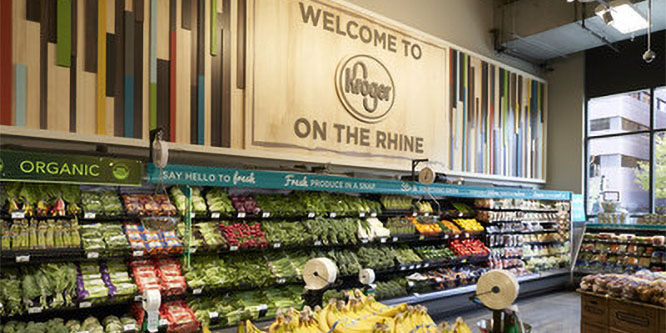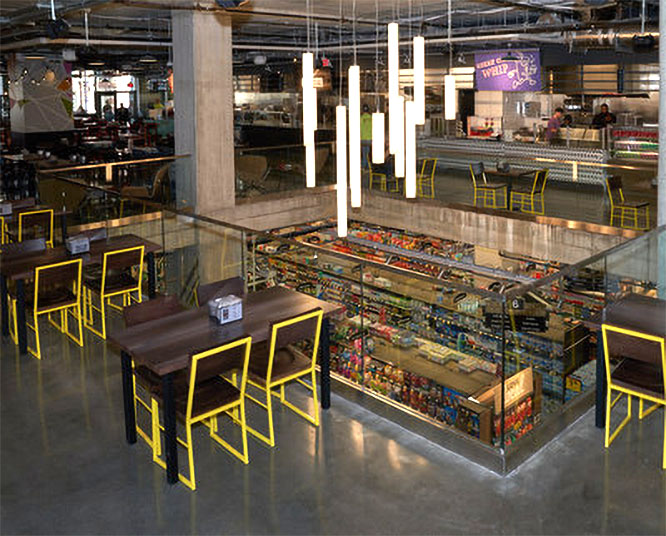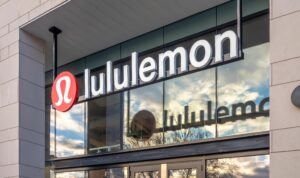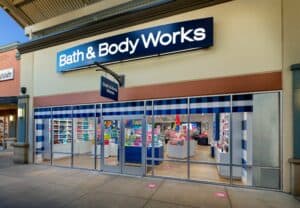
Photo: Kroger
September 30, 2019
Will consumers go for Kroger’s food hall concept?
Kroger, the second-largest grocer in the U.S., has opened its first food hall inside a new store in downtown Cincinnati, near its headquarters.
The Rhine Eatery, on the second floor of the 52,000-square-foot space, features five local Cincinnati restaurants: Kitchen 1883 Café and Bar, DOPE! Asian Street Far, Django Western Taco, Eli’s BBQ and Queen City Whip. The space, which can accommodate 200 customers in both indoor and outdoor seating, also includes a Kitchen 1883 Café and Bar, Kroger’s American food restaurant concept.
The first floor offers a traditional supermarket experience, including fresh fruit and vegetables, as well as grab-and-go and ready-to-heat meals, to support downtown workers and residents in addition to customers from the city’s Over-the-Rhine and West End neighborhoods. The store anchors an 18-story apartment building and is a block away from The Kroger Co. headquarters.
The urban concept further stands out for its walk-up window for beverage orders. Grocery and eventually restaurant delivery will be featured.
Kroger hasn’t operated a store in downtown Cincinnati since 1969 and has talked about doing so since acquiring the upscale, urban-focused Mariano’s chain in 2015.
“This innovative destination highlights Kroger’s food-first culture,” said Kroger’s chairman and CEO Rodney McMullen said in a statement.

Food halls, offer mini-restaurants run by artisanal and local vendors, have been expanding rapidly across the U.S. over the last decade and often support nearly retail. They are said to particularly appeal to Millennials looking for variety and authentic experiences.
Several grocers have been opening sit-down eateries over the last two decades that some describe as casual food halls selling the grocer’s ready-made foods. Some including Hy-Vee and Wegmans have added in-store restaurants that they operate themselves. Others, including Whole Foods and Mariano’s, have partnered with outside restaurants to show support for the local community. Partnering with a popular hotspot can also elevate the cachet of a grocer’s sit-down offerings.
- Kroger Opens Two-Level Store in Downtown Cincinnati with First-Ever Food Hall – Kroger
- Kroger debuts first in-store food hall – Supermarket News
- How Supermarkets Are Satisfying Changing Tastes – New Jersey Monthly
- Philly’s newest Whole Foods to feature dishes from Cheu, Dizengoff at 140-seat food hall – Philly Voice
- Can food halls become retail’s new anchors? – RetailWire
- Where you can buy your cake and eat it, too – The Boston Globe
- Grocery Stores Draw Millennials With In-Store Restaurants – NPR
Discussion Questions
DISCUSSION QUESTIONS: Are food halls a natural complement to grocers’ urban locations? What are the pros and cons for grocers around working with third-party restaurants versus developing restaurants in-house or just relying on prepared food offerings?
Poll
BrainTrust
Lisa Goller
B2B Content Strategist
Ron Margulis
Managing Director, RAM Communications
Recent Discussions








A grocery store anchoring an 18-story apartment building. Wow. Now how about if the food hall was a “fitting room?” “Did you like it? Here’s a shopping list. You’ll find everything you need downstairs. Happy cooking!” Food hall as classroom. Explore + Experiment = Experience.
I would say that food halls are definitely a natural complement to downtown areas these days. Whether grocery stores can find enough customers there now to also be successful remains an open question.
Whole Foods has opened an urban location in Denver, and there are various food hall-like locations nearby. That Whole Foods location kind of feels like a food hall in its design, in that even for them it offers a lot more emphasis on prepared and grab and go, even restaurant style take-out.
So that part of Kroger’s strategy makes sense – you have to serve a greater range and meet the demand for “do it for me” everything, from packaging it together so I can make it at home to just making it for me and serving it to me.
As far as the potential competition goes, you have to think more about the food hall as the traffic driver, and the grocery store serving the “fill in trip” function that people go to after their meal – “Oh yeah, I forgot I need tortillas for tonight’s dinner” (or whatever it may be). No urban location is going to serve a big pantry/full shopping cart run, so you might as well embrace capturing whatever other trips you can, even if that means people fill one meal need by paying a nearby restaurant for that meal before they go shopping at your store.
Food halls absolutely complement grocers’ urban locations. They’re magnets for consumers passionate about multisensory culinary experiences. What a brilliant way to attract consumers (including Millennials with growing families) with an authentic market feel that celebrates local vendors. Adding an artisan ambiance to urban communities also differentiates Kroger from Walmart, Amazon and rival grocers.
I love the concept. I believe they should have including one or two Kroger-specific restaurant offerings along with the third-party local units. This could have served as a testing ground for things like prepared meals in their main store. Kroger has been doing most things right in their efforts to meet new customer expectations and this is 90 percent right. I just think there was an opportunity missed.
If Mariano’s and Eataly were married, this is what you’d get. And it’s a beautiful child. The minute Mariano’s food court appeared in our semi-dense with professional buildings suburb of Chicago, it was packed. The fresh food quality, variety and convenience of dine-in or take-out was exactly what the local business population wanted. But it was strictly a business hours business. Evening traffic was nil. The addition of multiple dining choices and popular local restaurants to the Kroger concept will only make this iteration more attractive. Depending on the density of nearby urban housing, it may even solve the dinner traffic problem. Great idea.
I believe food halls are a natural complement to both urban and suburban locations. It is just another evolution of the supermarket. Wegmans in Natick, Massachusetts is a great example of how this idea works in a suburban setting. Wegmans took over anchor space from a Sears in the Natick Mall and created a truly unique experience in this two story location. They have a food court which they run on the second floor with shopping cart escalators that allow full access to the upstairs food court location. Shoppers want a one-stop experience and I think Kroger has a unique spin on the concept that allows them to go beyond their prepared foods offerings and create a destination shopping experience.
FWIW, in the mid 1970s, an early food hall concept was called Tally Hall, at a shopping center in Farmington Hills, Oakland County, Michigan, People flocked to it for awhile, but then it failed eventually because artificial shopping environments need to be constantly refreshed. (The same thing happened with Greektown as a destination in Detroit at that time. Eventually “everybody” who wanted to go went and they didn’t feel a pressing need to return.)
https://www.detroityes.com/mb/showthread.php?19272-Any-surviving-information-on-Tally-Hall-(the-food-court-NOT-the-band)
The success of food halls “in the suburbs” is dependent on the particular location’s level of “urban-ness” which wasn’t possessed by Tally Hall. Suburban business districts and town centers can support food halls, but any old location where a real estate developer is more focused on “activation” without the necessary preconditions won’t.
I haven’t seen the new Kroger store, but the physical design reminds me of Harmon’s City Creek store in Salt Lake. It is a two floor store with different ground entrances for each floor at different levels because of the grade of the site. The upper floor is not quite food hall but it’s where Harmon’s has a cafe/deli/grab and go operation, plus their demonstration kitchen, post office space, etc.
Not sure that the location could support a full blown food hall, but grocers have the opportunity to be creative with such sites and in urban locations, as more companies are demonstrating with these kind of one off stores (many other examples end up being featured as “store of the month” in the Progressive Grocer trade magazine.
For any retailer with urban stores, the more you can provide to the shoppers in the area the better you increase your odds of getting more consumers into the store. There are many positives here to offering numerous, diverse food choices that are not “grocery store made” and the retailer creates a different type of shopping experience. A con for the retailer is the potential for high turnover of the restaurants in the retailer’s space. Plus, the retailer needs to make sure they get the grocery shopper dollars, not just the restaurant sales from the customers.
Kroger’s food hall concept extends the mini-popups you can find at many locations. Retailers like BJs, Trader Joe’s, and more have the miniature, prepped food offerings at various stations around the store. Target and Walmart have built in third-party in-store fast food, and Wegmans has a full restaurant experience inside the store.
The food hall extends dwell time in the store, brings a convenience factor that other avenues can’t provide and offers another choice for customers. These stores can operate independently and fills excess store space with profitable offerings that improve customer experience. Retailers can own part of or the whole experience depending on how they partner with the eateries. More brand conscious grocers will opt for owning the entire experience. Good move by Kroger, but the trend will be determined by location and retailer.
What’s not to like? Food brings people together. The Reading Terminal Market in Philadelphia and Faneuil Hall in Boston are always packed. So are the food courts at Wegmans and Mariano’s most nights. This sounds great; it’s urban and artisan and fun. And a great way to build community around a store.
As a foodie, I’ve gone out of my way to visit food halls around the world (much to my wife’s chagrin). Harrods in London, the Reading Terminal Market in Philadelphia and the Great Food Hall in Hong Kong are three of the best and they couldn’t be more different. Harrods is almost exclusively for the rich, with its caviar bar and $1,000+ picnic baskets. The Reading Market is utilitarian, serving great food at a great price. The Great Food Hall is smack in the middle, a mix of everyday Chinese food and luxury foreign delights.
This should be a lesson for retailers wanting to set up food halls in current or future real estate. You need to know the consumer and the market. Harrods wouldn’t work in Baltimore and the Reading Market wouldn’t work in Beverly Hills. Interestingly, an American variant of the Great Food Hall (hamburgers or pizza instead of ramen noodles) could work in most urban settings because it will have something for just about everyone and doesn’t require the build-out or the stocking cost of a Harrods-like hall.
Instead of Reading Terminal Market in Beverly Hills, you have Grand Central Market in LA, which a few years ago Bon Appetit said was “one of the best restaurants in America” and an explosion of food halls across Southern California.
This is an outstanding move by the Kroger team, as they meet the needs of ever-demanding, time-strapped, on-the-go young professionals. Yes they will go for Kroger’s food hall concept, and in droves. The culture and experiential side of food and sharing meals is always a prime target for grocery stores, yet up to this point this segment has not been tapped into, outside of Wegmans and Whole Foods.
For the Kroger team, this offers an entry point into a more affluent customer, who may be new to the grocery brand. This also enables Kroger to capitalize on the prepared foods market, which could be a potentially high-margin, significant revenue growth segment for the grocery chain. It will be very interesting to see how this transformation plays out.
Food halls are a great compliment to, in particular, upscale groceries. Serving up “fresh prepared meals” meets customer requirements and encourages visits. The U.K. and Canadian grocers have been at this for some time now, and the lunch and dinner lineups probably attest to their success.
Nicely done, Kroger’s. They have been mixing up their stores here with pubs and more food options. This is a reasonable extension.
What it seems to reflect that is particularly important is that consumers don’t have hard boundaries any more between grocery, prepared but uncooked food, and fully prepared meals. So establishing the connection between “food” and “Kroger” seems quite likely to work.
That said, success will now be in implementation. We need to hope they have smart people with restaurant experience running the operation.
Brilliant. Fast. Fresh presentations. Designed to create frequent visits. Great concept. Come in and stay a while. I believe this positions Kroger as striving to be a market leader serving notice to competitors and customers that they are working incredibly hard to earn their business, all while creating an incredible environment. Not a new idea, but well done Kroger.
As noted by others, this is a terrific strategic move by Kroger. Given the demographics of the area and the density of nearby housing, this food hall/grocery store concept gives consumers the ultimate choice options – we will sell you the ingredients for you to make a meal and/or we will make you a meal. Plus, it adds to the overall ambiance of a traditional supermarket as well as providing bonafide authenticity to the role of supermarkets helping customers to decide what’s for dinner tonight.
From Darling Harbor in Sydney, to Yorktown in Toronto, to Tokyo Midtown developers have learned that people will pay extra to live in a building with grocery attached. They may not, but they could, shop in the their bedroom slippers. H-E-B in Texas developed Central Market – an upscale urban format — some 15 years ago. Thursday nights were singles night – lowered lights, wine samples and many a Texas man got in trouble for volunteering to do the family shopping on an odd Thursday night …
Food halls are a natural complement to grocers’ urban locations – their brand has more visibility, they can supply the food hall easily, and food halls will attract customers. In a dense downtown area, the food hall is better than just having prepared food as it gives the customer the option to try fresh foods, especially the ethnic food that Kroger’s Food Hall will have. Third-party restaurants may take a portion of the profits from the food hall, but they will attract customers that Kroger could not get on its own.
Food halls are not only a natural extension recognizing rapidly changing consumer demographics, the business model has already been proven in urban and suburban markets across the U.S. and abroad.
Grocery leaders such as Kroger certainly recognize that looking beyond traditional competitors and even pure-play digital player threats – by setting their long-term strategic goals to be the most credible providers of fresh/farm-to-fork across the broader spectrum of “share of stomach” — this is something they could credibly own.
The real question here is, which grocer can also incorporate the right limited local assortment and fresh grab and go snacks, meals and delivery options into the adjacent store AND scale this out rapidly beyond a single, or even a handful of locations?
Beyond testing a single location, first mover (at scale) advantage also applies. In that case, Kroger certainly has an opportunity here that many traditional grocers simply don’t.
Just got back from the Food Service Summit which Winsight put on, and I spoke during one of the sessions. This Kroger Food Hall got a lot of discussion and everyone liked the idea, which I believe will do well, as it is in a high income area. Can they sell enough of the supermarket product to make this work? That is where the gravy profits needed to keep this concept going come from. Like Eataly, which does amazing business. Hopefully for Kroger it works out. If needed, they will tweak it to increase prepared foods if demand grows for this concept and shrink the other areas. Overall it should do quite well.
Cincinnati is a ready-market for this concept. Kroger seized the opportunity to bring this experience to southern Ohio, taking the Halo for their brand.
I don’t like it. But what a great way for Kroger to profit off of small farms, both collecting rent and a portion of their profits in exchange for the cachet of small local businesses. It’s like the Amazon model. They don’t have to go to the trouble of being small and artisanal, or faking small and artisanal, they can still offer it and profit — remove the competition of these other business models.
And just like Amazon, the small retailers are somewhat forced to trade profit and independence for access and distribution channels. Independence, because once their distribution model relies on Kroger, Kroger can threaten them with non-renewal or eviction if they can’t control them. Win-win!
Food halls are a natural; particularly in an urban environment in your home town.